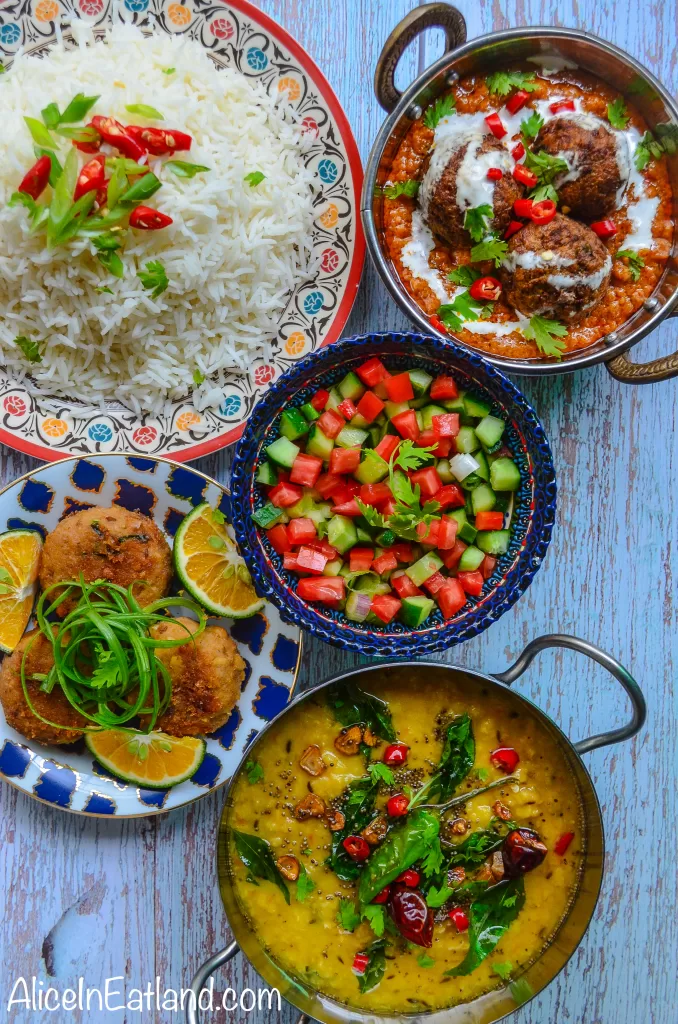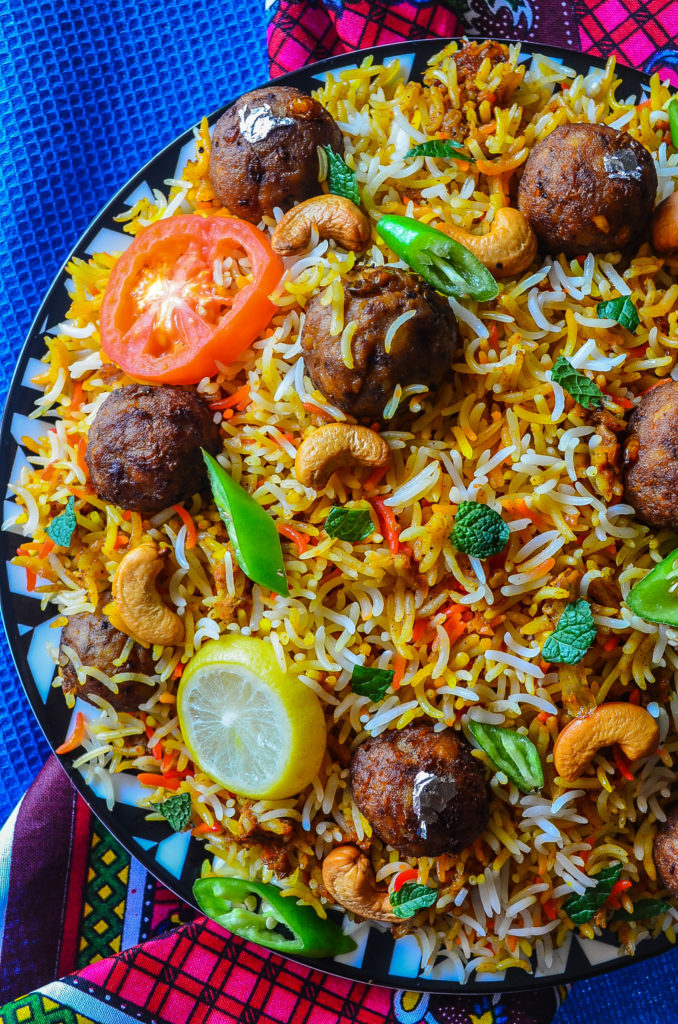
A home-cooked budget friendly meal.
Clockwise from top left: Boiled White Rice, Zucchini Malai Kofta Masala, Kachumer Salad, Moong Masoor Tarka Daal and Aaloo Channa Daal Cutlets
With food costs at an all time bone-crushing high, it is no surprise that most of us are feeling quite the pinch when it comes to eating well and feeding our families.
The idea is to be able to feed yourself and your loved ones delicious, wholesome and nutritious meals while also being able to:
-Spend Less
-Get The Most Out Of Your Purchases
-Minimise Wastage
-Save
Here are 23 practical tips that have helped me cut down on my overall food budget with the hope that you too will find some or all of these tips useful:
1. Track Your Spending
This is absolutely ESSENTIAL and the first step to getting your food budgeting on track.
Once you get this down right, everything else will fall into place and make sense so please don’t skip it.
Get a notebook (the old-school paper kind) and a pen.
Jot down every single food bill and food related expense you incur for 1 week (takeout, grocery bills, restaurant meals etc).
Writing every single amount down on paper and adding it all to arrive at the total hits different.
2. Assess Your Spending
Once you have an idea of your weekly and hopefully monthly food spending, do a thoroughly honest assessment of whether your money is being spent wisely or not.
How many are essential food items and what are your impulse purchases?
Are you buying too much food?
Do you really need 4 bags of frozen fries a month when maybe 2 will do just fine?
Can you cut back on a pricey ingredient and use a cheaper substitute?
Think about it.
3. Set A Budget
Once you have your overall food bill and related expenses roughly figured out, try to set a realistic food budget based on your family’s requirements, preferences and lifestyle.
Challenge yourself to stick to it.
4. List Down Meals, Snacks & Drinks
Next make a list of:
–breakfasts, lunches and dinners that your family mostly eats on rotation.
-snacks (crisps, frozen ready to cook products, candies etc).
-drinks (water, teas, coffees, soft drinks etc).
-takeout/delivery meals that you usually order in.
-restaurant meals that you may be going out to eat that week.
5. Meal Plan For The Week
Once you have the above list done, choose meals from it and allocate for all 3 mealtimes (plus snacks and drinks) for each day of the week.
Also factor in any meals that you’ll be ordering in or eating out during the week (hopefully just one, maximum).
Meal planning not only eliminates the daily stress of racking your brains about what to cook but keeps you from spending on extra ingredients you may not need that can add up unnecessarily to your food bill.
6. Shop Your Pantry, Fridge & Freezer
Based on your meal plan, write down the ingredients required for each meal for the week.
Then do a thorough inventory check to see which ingredients are in stock and what needs to be purchased.
You don’t want to spend on a new box of pasta when there are 3 already, waiting to be used.
The same goes for useable vegetables, fruit and protein that you may already have in your fridge or freezer.
Make a note of spices and condiments on hand as well.
7. Overlap Ingredients
When trying to reduce your weekly or monthly food bill, it really helps if you can use one or more main ingredient for multiple recipes.
For example, boiled potatoes can be used to make Aloo K Parathay and Aloo Cutlets for the freezer.
Or if you make Marinara Sauce, use half of it to make simple spaghetti topped with your favourite protein and freeze the remaining to use as sauce for a homemade pizza later.
8. Lean Towards Vegetable-Based Meals
As produce heavy dishes take the spotlight like never before, it makes sense to eat more vegetable driven meals not just for health benefits but also for economics.
Inexpensive items like grains, beans and legumes are a great way to stretch your meals on a budget and lower your food bill.
Platforms like Pinterest and YouTube offer a staggering array of veg centric recipes should you wish to explore wildly delicious vegetable-based meals beyond the usual daal sabzi realm.
Shameless Plug: explore this blog and my YouTube channel for some great veg friendly main, snack and dessert recipes!
9. Shop At Less Expensive Stores
Stores that offer more affordable prices without compromising on quality are your best bet.
In Pakistan, think of stores like Metro, Imtiaz and CSD.
Also assess if ordering groceries online from a certain store will cost you more or less compared to physically shopping there.
10. Buy Store Brands
Many store brand products (like grains, spices etc.) are generally cheaper and of pretty much the same quality as many of their branded counterparts.
They’re a great choice when food budgeting.
Try them.
11. Limit Specialty Foods
I adore imported raspberries and blueberries and love locally grown exotic vegetables such as oyster mushrooms and poblanos and have a fondness for cheeses (both imported and a few locally produced artisanal ones).
But due to the very high retail prices associated with the above, my use of them is now limited to rare and special occasions only.
In my quest to reduce my weekly food bill, I try and make use of more affordable substitutes and a lot of times they work just fine.
12. Bulk Purchase
Bulk purchases are often more economical than buying smaller quantities repeatedly.
Bear in mind that bulk purchases make sense only if you bulk use them.
No sense buying a 5 kg bag of rice when you use it just once a month.
13. Shop Sale Items Sensibly
Again, buy sale items only if it makes sense.
That huge box of cornflakes at half price is no good if you’re going to use it just a few times a month.
14. Stick To Your Shopping List
Try your best not to give in to the urge to buy random things just because.
Impulse buying is unwise to say the least when you’re trying to stay on a budget so it is important you know and understand your triggers.
15. Bulk Cook & Make Freezer Meals
Most fully prepared food items from daals, rice and roti to lasagna, pizza and burgers freeze very well.
Save yourself the time, energy and money by bulk cooking enough to get at least 2 freezer meals out of every cooking session and thank yourself later.
16. Limit Grocery Runs (In Store and Online)
Try not to give in to the urge of ordering ingredients when they run out, unless they are absolutely essential.
Many times you can make do with an acceptable substitute already available at home or make do without entirely, saving money (including commute costs and delivery charges).
17. Grow Your Own Herbs
Fresh herbs from the store may not exactly put a dent in your food budget but if you use them quite often, its a good idea to grow them yourself.
Most herbs like coriander, mint and parsley are easy to grow, don’t require much space (they thrive in pint sized flowering pots) and are low maintenance.
They may not cost a lot but don’t forget that even the smallest purchases add up.
18. Repurpose Leftovers
Freeze leftover meals for another day.
Or use them to make other meals.
For example, use leftover plain cooked/boiled rice a day or 2 later to make fried rice with lots of veggies and your choice of protein.
Your freezer is your friend. Use it wisely to save time, hassle and money.
19. Minimise Meal Deliveries And Takeaways
With a multitude of food choices to suit every mood and budget just an app away, it is now easier than ever to order meals in.
I am all for supporting local businesses but I also have a keen focus on minimising my overall food bill.
Hence I opt for the convenience of ordering in only on days I’m crazy busy, not feeling too well or just plain dead tired to cook.
And for me, that’s once a month at the most.
20. Limit Restaurant Meals
It goes without saying that eating out these days can cost an arm and a leg.
Even a cup of coffee at a decent café can set you back around PKR 1000 per person.
It’s natural to want to go somewhere nice for a meal sometimes but bear in mind that it does come with a price.
21. Socialise Wisely
Its ok to say no to meeting friends at pricey eateries.
Alternatively, you can recommend catching up somewhere less expensive.
Or suggest getting together at home (yours or theirs) and doing a potluck or one-dish party with everybody bringing one food item (homemade or store bought, whichever is affordable) each.
Real friends will understand and respect your need to be financially wise.
Be smart about your both friends and finances.
22. Change Your FOMO to WOMO
Try not give in to the urge of heading to high-end bakeries, cafés and restaurants just because friends, someone on a food forum or an influencer on social media posted gorgeous photos and glowing reviews about it.
The temptation may be high but please do not forget that right now may not be the wisest time to give in to the extravagance of exorbitantly priced food.
Change your FOMO (Fear Of Missing Out) to WOMO (Wisdom Of Missing Out).
23. Don’t Lose Your Focus
Despite your best intentions, life happens and sometimes it’s easy to get sidetracked.
It’s ok.
Get back on track as quickly as you can.
Keep an eagle eye on what you cook and eat so you know exactly where your money is going.
Don’t forget that when it comes to your overall food bill, every single thing adds up.
Remember the reason you’re reading this post.
Remain focused.
You got this.


 Tikka Kofta Biryani: juicy barbecue-smoked tikka flavoured plant-based koftay on a bed of fluffy fragrant masala rice, the stuff of biryani dreams!
Tikka Kofta Biryani: juicy barbecue-smoked tikka flavoured plant-based koftay on a bed of fluffy fragrant masala rice, the stuff of biryani dreams!







